Search the Special Collections and Archives Portal
Search Results
Howard Wasden oral history interview
Identifier
Abstract
Oral history interview with Howard Wasden conducted by Gillian Collins on an unknown date in the 1970s for the Ralph Roske Oral History Project on Early Las Vegas. In this interview, Wasden discusses arriving in Las Vegas, Nevada in 1925 and working for the railroad. Wasden explains how the railroad was a predominant economic asset for Las Vegas at the time. He then describes living on the Westside "Old Town", education in Las Vegas, attending the University of Nevada, Reno, and eventually becoming a teacher. Lastly, Wasden discusses the population growth, development of the Las Vegas Strip, and his role as principal of West Charleston School.
Archival Collection
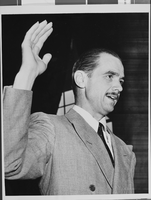
Photograph of Howard Hughes at hearing, Washington, August 06, 1947
Date
Archival Collection
Description
Image
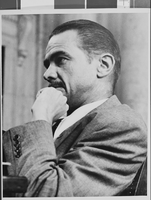
Photograph of Howard Hughes at hearing, Washington, August 06, 1947
Date
Archival Collection
Description
Image

Photograph of a banquet for Howard Hughes, Texas, 1938
Date
Archival Collection
Description
Image
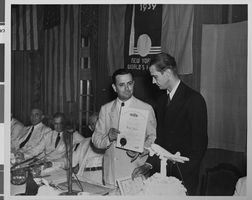
Photograph of a banquet for Howard Hughes, Texas, 1938
Date
Archival Collection
Description
Image

Transcript of interview with Mark Hall-Patton by Claytee White and Stefani Evans, August 25, 2016
Date
Archival Collection
Description
Mark Hall-Patton, administrator of Clark County Museums and since 2008 a frequent guest on the popular cable television show Pawn Stars, was born in 1954 in San Diego, California. His mother was a registered nurse and his father served in the United States Navy. From early childhood, Mark’s interest in history and museums shaped his path in life. After graduating high school in Santa Ana, California, he earned his Bachelor’s degree in history at nearby University of California, Irvine. Degree in hand, Mark worked for Bowers Museum in Santa Ana and founded the Anaheim Museum in 1984. He moved to Las Vegas, Nevada in 1993 to create the Howard W. Cannon Aviation Museum in McCarran International Airport. By 2008, Mark had become administrator over all Clark County museums. In this interview, he explains the various ways his involvement with the popular Pawn Stars program has turned “the museum guy” into a brand, introduced production companies to the value of filming in Las Vegas, increased Clark County museum visits and donations, and raised popular awareness of the academic fields of history and museum studies.
Text
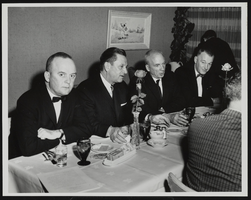
Howard Cannon with others at a dinner in his honor: photographic print
Date
Archival Collection
Description
Image
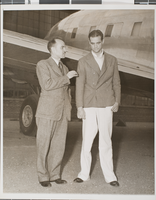
Photograph of Howard Hughes, circa late 1930s
Date
Archival Collection
Description
Image
Howard Wasden Elementary, 1982
Level of Description
Archival Collection
Collection Name: Young Audiences New York, Nevada Humanities Collection
Box/Folder: Box 03
Archival Component
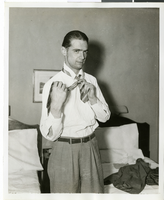
Photograph of Howard Hughes, January 14, 1936
Date
Archival Collection
Description
Image
